Robinho: Arrest, Trial and Life in Prison
The fall from grace of former Brazilian football star Robinho represents one of the most dramatic downfalls in modern sports history. From the pinnacle of world football—playing for clubs like Real Madrid and Manchester City—to imprisonment for sexual assault, his story serves as a stark reminder that fame and talent provide no immunity from justice.
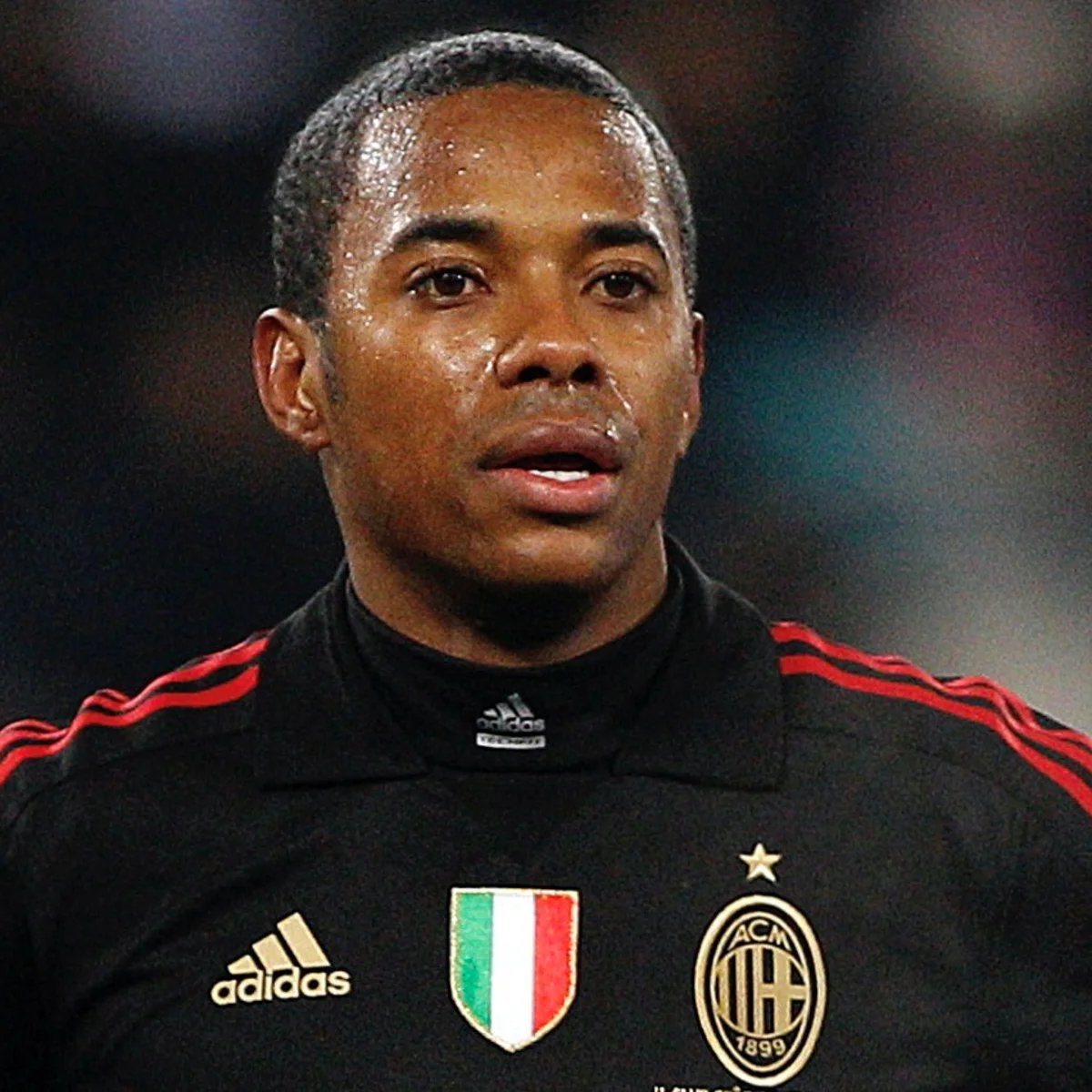
Conviction for Rape
Events of 2013 in Milan
On January 22, 2013, while playing for AC Milan, Robinho’s life changed irreversibly. What began as a night of celebration at the Sio Cafe nightclub in Milan ended with a 23-year-old Albanian woman being sexually assaulted. According to court documents, Robinho and five other men, including his friend Ricardo Falco, participated in the gang rape of the woman who had been rendered incapable of resisting due to excessive alcohol consumption.
The incident remained largely unknown to the public until legal proceedings began. What later emerged through intercepted phone calls and text messages was damning evidence of Robinho’s involvement. In one particularly incriminating recording, Robinho was heard saying, “I’m laughing because I don’t care. The woman was completely drunk. She doesn’t even know what happened.”
These recordings, along with DNA evidence and witness testimonies, formed the cornerstone of the prosecution’s case. The victim’s testimony described a horrific experience where she was led to a wardrobe at the back of the club and repeatedly assaulted while incapacitated.
Trials in Italy
The legal process in Italy was thorough and extended over several years. In November 2017, the Court of Milan found Robinho and Ricardo Falco guilty of sexual assault and sentenced both to nine years in prison. The other four men involved in the assault were not tried, having left Italy before the proceedings began.
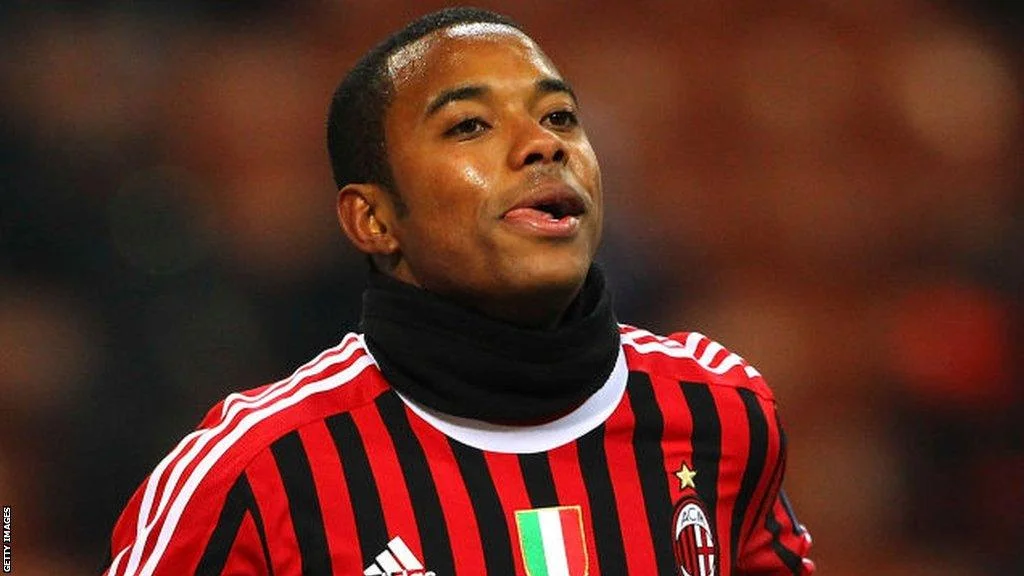
Robinho, who was playing for Atlético Mineiro in Brazil at the time of the conviction, immediately denied the charges and appealed the decision. Throughout the appeals process, he maintained his innocence, claiming the encounter was consensual and that he was the victim of racism in the Italian justice system.
In December 2020, the Court of Appeal in Milan upheld the original conviction, rejecting Robinho’s appeal. The court stated that Robinho had “belittled” and “brutally humiliated” the victim, showing “particular contempt” for her condition. The judges also noted that Robinho’s recorded statements demonstrated a “total disregard for the victim’s condition.”
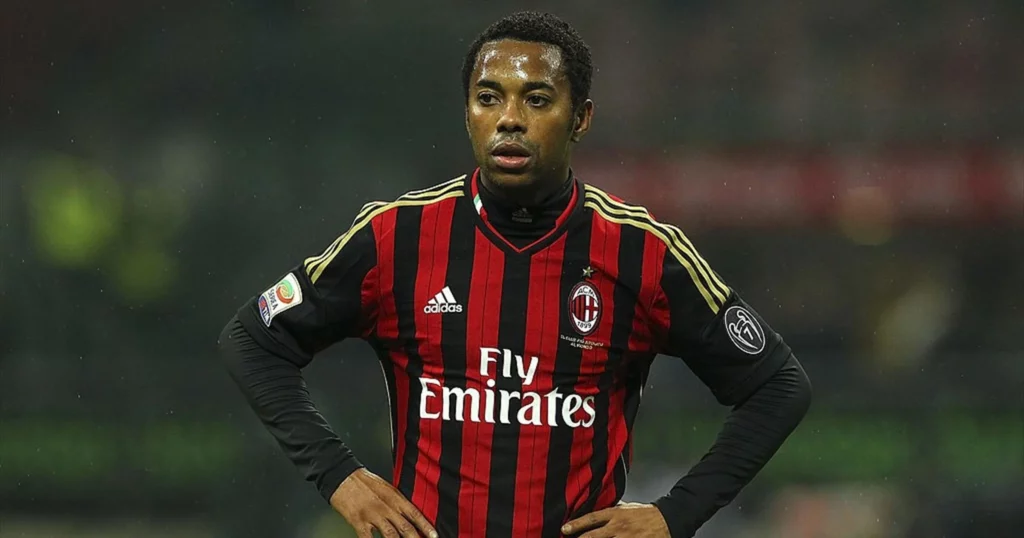
Final Decision of the Supreme Court
The final legal avenue for Robinho was the Italian Supreme Court (Court of Cassation). On January 19, 2022, the court delivered its verdict, confirming the nine-year prison sentence and effectively closing any further appeals in Italy. The ruling declared that the evidence against Robinho was “abundant and solid.”
With the conviction finalized in Italy, attention turned to Brazil, where Robinho had been residing since leaving Turkish club İstanbul Başakşehir in 2020. Brazil’s constitution prohibits the extradition of its citizens, creating a complex legal situation regarding the enforcement of the Italian sentence.
Public and Media Reaction
Fallen Reputation
The public reaction to Robinho’s conviction was swift and severe. His once-celebrated name became synonymous with disgrace. Brands that had previously associated with him quickly distanced themselves, and his marketability as a public figure evaporated overnight.
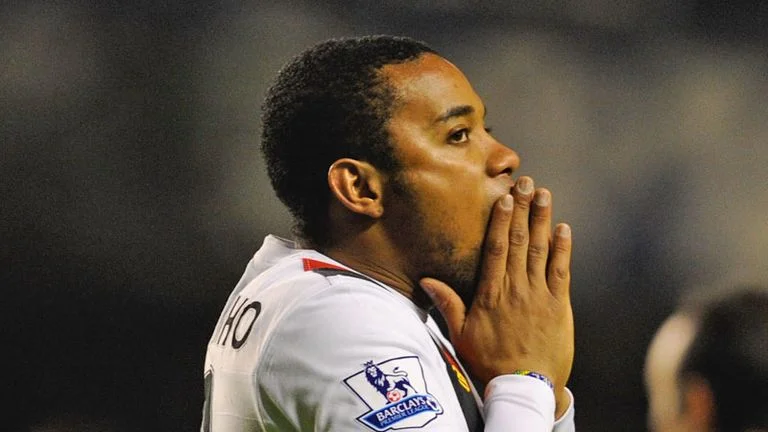
Media coverage was extensive and largely condemnatory. In Brazil, a country that had long celebrated Robinho as one of its football heroes, the reaction was particularly poignant. Major newspapers and television networks that had once chronicled his sporting achievements now detailed his criminal acts and subsequent legal battles.
Perhaps most telling was the reaction when, in October 2020, Santos announced Robinho’s return to the club for a fourth stint. The public backlash was so intense that sponsors threatened to withdraw support, forcing Santos to suspend the contract just days after its announcement. This episode demonstrated how completely Robinho’s reputation had collapsed.
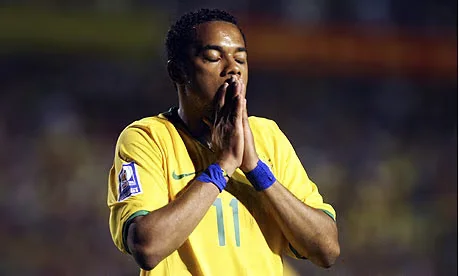
Reaction of the Soccer Community
The football world’s response to Robinho’s conviction revealed evolving attitudes toward sexual violence. While some former teammates and associates initially offered support or remained silent, many influential voices within the sport condemned his actions.
Notable was the response from women’s rights organizations and female players who spoke out against attempts to rehabilitate Robinho’s image within football. The Brazilian Football Confederation (CBF) notably distanced itself from the player who had once been a centerpiece of the national team.
Former Brazil international Walter Casagrande was among the most outspoken critics, stating that “Robinho’s return to Santos was a slap in the face for all women.” Similarly, Brazilian football journalist Juca Kfouri described the attempted Santos return as “an insult to all victims of sexual violence.”
Arrest and Imprisonment in Brazil
Refusal of Extradition
Following the final Italian verdict, the question became whether Robinho would serve his sentence. As a Brazilian citizen residing in Brazil, he was protected from extradition by Article 5 of the Brazilian Constitution, which states that “no Brazilian shall be extradited.”However, Italian authorities requested that Robinho serve his sentence in Brazil, a possibility under international judicial cooperation agreements.
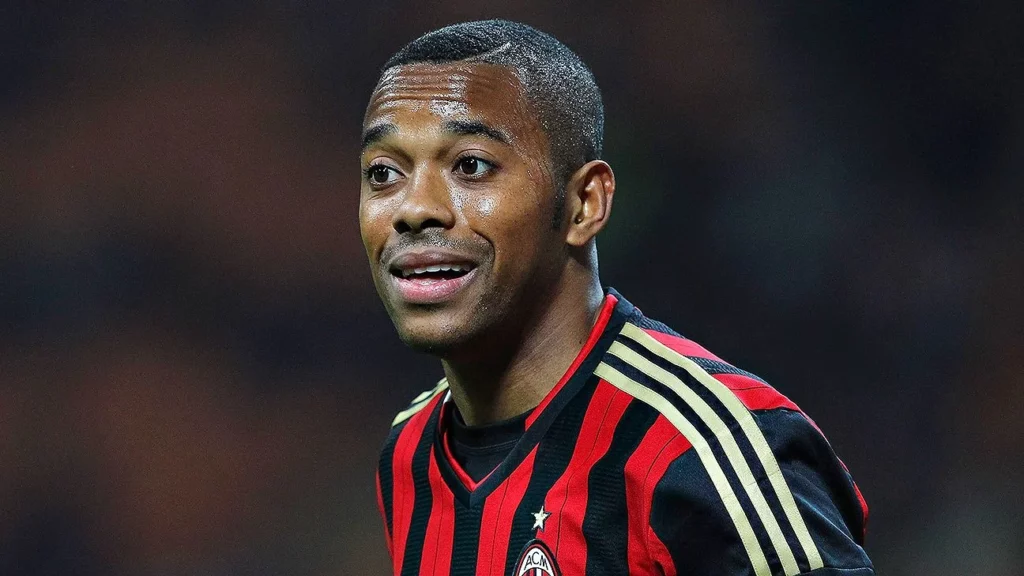
In late 2022, Brazil’s Superior Court of Justice (STJ) began reviewing the case to determine whether the Italian sentence could be enforced domestically.
On March 15, 2023, the STJ ruled that Robinho’s nine-year sentence could indeed be enforced in Brazil. This landmark decision set a precedent for international judicial cooperation in criminal matters involving Brazilian citizens convicted abroad.
Tremembé Prison and Conditions
Following the STJ ruling, Robinho was arrested on March 17, 2023, at his Santos apartment and transferred to Tremembé Prison in São Paulo state. Known as the “Famous Prison” for housing high-profile inmates, Tremembé offers somewhat better conditions than other facilities in Brazil’s overcrowded penal system, though it represents a dramatic contrast to Robinho’s former lifestyle as a millionaire footballer. His daily routine begins at 6 AM, with most time spent in a 12-square-meter cell, limited access to a small exercise courtyard, communal meals, and few recreational activities. While former inmates describe Tremembé as relatively orderly compared to other Brazilian prisons, the confinement and regimented schedule mark a profound change for someone who once enjoyed the freedom and acclaim of international football stardom.
Attempts to Review the Sentence
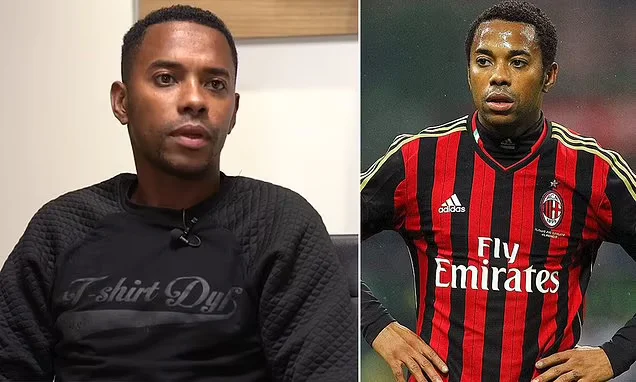
Robinho’s Lawyers’ Strategy
Since his imprisonment, Robinho’s legal team has pursued multiple strategies to challenge or reduce his sentence. Their primary approach has focused on procedural arguments, claiming that the Italian trial did not meet standards of due process and that the Brazilian enforcement of the sentence violated constitutional principles.
In April 2023, his lawyers filed a habeas corpus petition with Brazil’s Supreme Federal Court (STF), arguing that the STJ had overstepped its authority in enforcing the Italian sentence. This petition was rejected by Justice Luiz Fux, who stated that the STJ had acted within its powers.
Possibility of Leniency
Under Brazilian law, Robinho could potentially benefit from sentence progression provisions that allow for gradual relaxation of detention conditions based on good behavior and time served. After completing one-sixth of his sentence (approximately 18 months), he could theoretically be eligible for day-release privileges.
Moreover, after serving two-fifths of the sentence (approximately 3.6 years) with good behavior, he could be eligible for semi-open conditions, allowing him to work outside the prison during the day while returning at night. However, these possibilities depend on judicial discretion and are not guaranteed, particularly given the gravity of his crime and the international attention the case has received.
Robinho Among Other Imprisoned Soccer Players’ Stories
Dani Alves’ Stories, Ronaldinho, Bruno and Others
Robinho’s case, while shocking, is unfortunately not unique in the world of football. Several high-profile players have faced serious legal issues and imprisonment in recent years.
Dani Alves, another Brazilian football star, was arrested in January 2023 on sexual assault charges in Spain. Like Robinho, Alves initially denied the allegations before changing his story multiple times as evidence mounted. His case is still proceeding through the Spanish legal system.
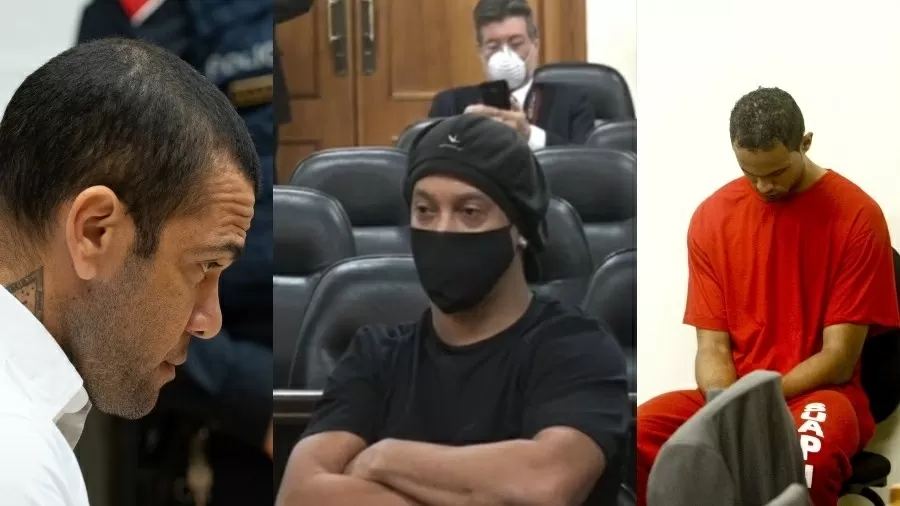
Ronaldinho, one of Brazil’s most beloved footballers, spent five months in detention in Paraguay in 2020 for using a false passport. Though his situation was very different from Robinho’s, it similarly demonstrated how quickly a football icon’s life can change.
Perhaps the most notorious case in Brazilian football is that of goalkeeper Bruno Fernandes, who was convicted of ordering the murder of his former girlfriend in 2010. Bruno served less than a third of his 22-year sentence before being released to appeal in 2017, and remarkably, he returned to professional football briefly afterward.
These cases collectively highlight issues of entitlement, accountability, and the complex relationship between fame, wealth, and justice in the world of professional sports.
Robinho’s Future
Possibility of Early Release
As mentioned earlier, Robinho could potentially benefit from Brazil’s progressive sentence system. The earliest he might be eligible for some form of early release would be after serving one-sixth of his sentence, which would be around September 2024.
However, legal experts note that sex crimes are treated with particular severity in the Brazilian justice system, and judges may be reluctant to grant early release benefits in such cases, especially given the international scrutiny of Robinho’s case.
Chances of Returning to Public Life
Whether Robinho could return to public life after serving his sentence remains doubtful. While Brazilian society sometimes allows for redemption narratives, sexual violence carries a particular stigma, and his global fame means his conviction will likely follow him permanently. A return to professional football is virtually impossible—at 40 years old in 2024, he would be past typical retirement age upon release, and clubs would face enormous backlash for signing a convicted rapist. Roles as commentator, coach, or administrator would also be difficult as they require public trust. More realistically, Robinho faces a future of relative obscurity, attempting to rebuild a normal life away from the spotlight. His dramatic fall from worldwide adulation to imprisonment represents one of football’s most cautionary tales, while for victims’ advocates, his case demonstrates that wealth and celebrity don’t provide immunity from justice, even across international borders.